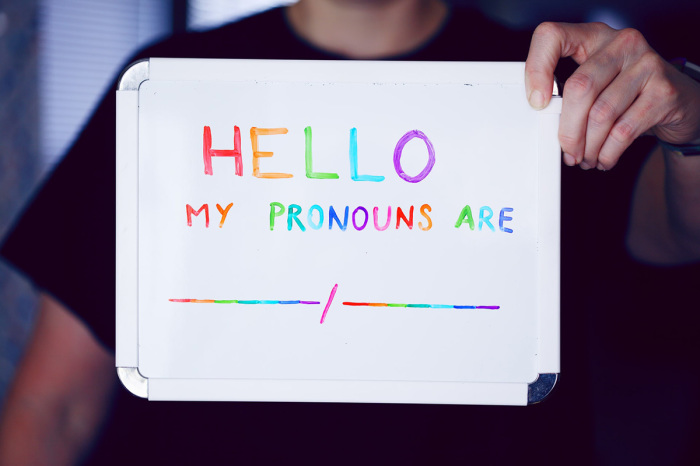
A federal appeals court has barred an Ohio school district from enforcing policies that opponents say compel students to use preferred pronouns for students who trans identify, as litigation surrounding the matter continues.
In a divided en banc ruling last week, the 6th U.S. Circuit Court of Appeals sided with the parental rights advocacy group Defending Education in its litigation over a policy in the Olentangy Local School District in Ohio that plaintiffs warned could punish students for referring to trans-identified and nonbinary students using their given name and pronouns as opposed to their preferred name and pronouns.
The 6th Circuit granted Defending Education’s request for a preliminary injunction, ruling that it was likely to succeed on the merits of its First Amendment arguments. The en banc ruling overturned earlier rulings from a federal judge and a 6th Circuit panel.
Judge Eric Murphy, a Trump appointee, authored the majority opinion. The opinion focused on the precedent set in the 1969 U.S. Supreme Court ruling in Tinker v. Des Moines, a case concerning the speech rights of students protesting the Vietnam War.
“This case about pronouns pits two important interests against each other. On the one hand, the school district has prohibited speech (biological pronouns) that expresses a message on a matter of pressing public concern. And because the district requires other speech (preferred pronouns) that expresses a competing view, it has discriminated based on its students’ viewpoints,” Murphy wrote.
“Its approach thus raises serious free-speech concerns. On the other hand, the school district rightly responds that it has a duty to protect all students — including transgender and nonbinary students — from bullying and harassment. And this protection, while necessarily restricting speech, does not violate the Free Speech Clause. So which of these competing concerns should prevail in this case?”
Murphy also wrote that the school district was “wrong to treat the use of biological pronouns alone as analogous” to “abusive invective.”
“Defending Education’s members want to use biological pronouns not because they seek to ridicule others but because they want to speak what they view as the truth (and cannot ‘affirm’ a view with which they disagree on a pressing matter of public concern),” the ruling stated.
Judge Jane Stranch, an Obama appointee, wrote a dissenting opinion in which she argued that such a policy was necessary to protect the mental health of trans-identified students.
“Though the record satisfied Tinker’s requirement that the School District’s forecast be
reasonable, the majority opinion concluded otherwise, positing and applying a new approach: that ‘the closer the speech resembles political expression at the First Amendment’s core, the more evidence a school must present of the potential disruption or violation of rights,'” Stranch wrote. “I have several concerns with this approach.”
Alliance Defending Freedom, the nonprofit legal organization that represented the plaintiffs in the litigation, praised the development in a statement published Thursday.
“First Amendment rights don’t disappear behind school doors — whether you’re a teacher, parent, or student. For many, the choice of pronouns communicates their belief that sex is immutable, and to use pronouns or names that reflect a gender identity inconsistent with sex violates their core convictions and tells a harmful lie,” said ADF Senior Counsel and Vice President of Appellate Advocacy John Bursch. “Schools can’t force students who hold that belief to use other pronouns instead.”
Thursday’s ruling comes more than a year after the full 6th Circuit agreed to rehear the case en banc after a three-judge panel on the federal appellate court upheld a district court ruling siding with the school district. The litigation dates back to 2023, when parents of children residing in the school district challenged aspects of the district’s policies related to anti-harassment policies and use of personal devices as well as its Code of Conduct.
As outlined in Thursday’s opinion, Policy 5517 authorizes the district to “vigorously enforce its prohibition against discriminatory harassment based on” gender identity.
The policy defines harassment as “any threatening, insulting, or dehumanizing gesture, use of technology, or written, verbal or physical conduct directed against a student or school employee,” including any speech that has “the effect of substantially interfering with a student’s educational performance, opportunities, or benefits” or of “substantially disrupting the orderly operation of a school.”
Policy 5136 prohibits students from using their “personal communication devices” such as cell phones and tablets “in any way that might reasonably create in the mind of another person an impression of being threatened, humiliated, harassed, embarrassed or intimidated.” The district’s Code of Conduct prohibits students from engaging in “harassment” or “bullying” in addition to using “discriminatory language.”
The definition of “discriminatory language” covers “verbal or written comments, jokes, and slurs that are derogatory towards an individual or group based on” gender identity and other characteristics. The plaintiffs challenged the policies as violations of the Free Speech Clause of the First Amendment to the U.S. Constitution.
The plaintiffs viewed Policy 5136 as a violation of the 14th Amendment because it regulated students’ use of electronic devices outside of school. The advocacy group expressed concern that the district’s policies prohibiting “misgendering” could have resulted in students facing “no-contact orders” as well as suspension or expulsion.
Defending Education President Nicole Neilly praised Thursday’s decision and its implications for the First Amendment in the U.S.
“We are deeply gratified by the 6th Circuit’s intensive analysis not only of our case but the state of student First Amendment rights in [the] modern era,” Neilly said. “The court’s decision — and its many concurrences — articulate the importance of free speech, the limits and perils of public schools claiming to act in loco parentis, and the critical role of persuasion — rather than coercion — in America’s public square.”
Teachers in other school districts have faced disciplinary action for declining to refer to trans-identified students using their preferred names and pronouns because of their deeply held religious beliefs about gender and sexuality. For example, Wisconsin teacher Jordan Cernek was fired in 2023 for opposing a requirement that teachers refer to trans-identified students by their preferred name and pronouns.
Virginia teacher Peter Vlaming faced a similar fate in 2018 while Kansas teacher Pamela Ricard was suspended in 2021 for calling a trans-identified student by her given name and pronouns. In response to these cases, several states have passed laws protecting teachers from having to use trans-identified students’ preferred pronouns: Idaho, Tennessee and Wyoming.
Ryan Foley is a reporter for The Christian Post. He can be reached at: ryan.foley@christianpost.com

















